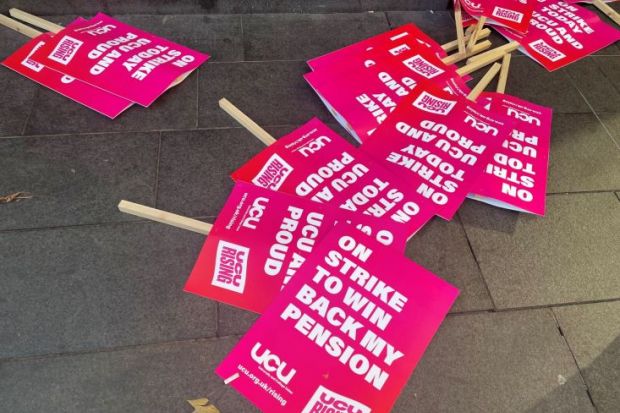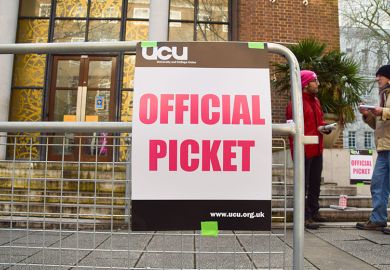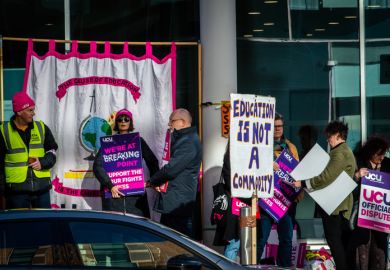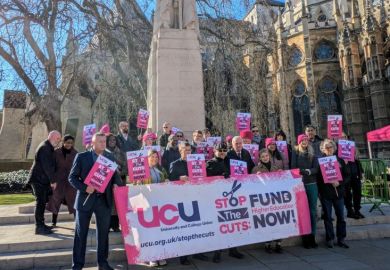Divisions within the University and College Union (UCU) are threatening to “overshadow” its flagship democratic event amid efforts to galvanise support for a “fight back” against job losses.
Members will meet in Liverpool over the bank holiday weekend for the annual congress, with the event already running into difficulty owing to clashing with celebrations being held by the city’s Premier League title-winning football club.
Bigger problems potentially await the union’s leadership as members look set to voice their frustrations over increasingly bitter tensions within UCU head office.
Staff who are members of the Unite union recently concluded six weeks of strike action over allegations of workplace racism and bullying, in an extension of a dispute that last year resulted in part of the congress being cancelled.
More recently, the dispute has resulted in Durham’s UCU voting to ban general secretary Jo Grady from its picket lines and meetings until the dispute is resolved.
Times Higher Education understands that there are efforts to introduce a late motion that would express “no confidence” in the union’s leader.
Vicky Blake, a former president of UCU who stood against Grady in the last leadership election, said that the ongoing dispute is an “elephant in the room, and it’s a very large elephant”.
“I want to go into this feeling positive about what we can do when we come together, and anyone who has been elected into any sort of position of leadership has a responsibility to emphasise that.
“But I do think we are up against a lack of confidence in the union’s ability to get things done, and I think the Unite UCU dispute and how that’s been handled, which exacerbated the problems rather than actually going any way to solving them, is in the background of that.”
Delegates are due to debate a series of motions, including ones centring on job losses and pay issues, enhancing internal democratic structures, and trans rights after universities began reviewing their trans inclusion policies.
One motion, put forward by Durham University, notes that there are “significant concerns” with the union’s democracy, and called for a special congress on the issue. Another has called for the union to declare an industrial dispute over pay.
Blake said that while there’s a “nervousness” about congress, there is also a “gritty determination” to “join together and fight back”, adding that the union needs a “coordinated” national campaign against the wave of redundancies hitting the sector.
Lucy Burke, a member of UCU’s national executive committee, said that there are “numerous shadows” being cast across congress, from the financial and redundancy crisis to the internal UCU dispute.
“There are so many fires burning on so many different fronts for people in HE, it’s just unrelentingly grim, and everybody feels very despairing and very pessimistic,” she said.
“It’s massively important to be able to respond quickly and appropriately to what’s happening to its members, and I think it’s difficult for that to be achieved whilst this dispute continues.”
Instead, what’s needed, she said, “is to feel that there’s some hope, and that there are things that we can do collectively to change all of this, and I think that’s what we would be looking for in congress. But I’m not sure that expectations are hugely high.”
There was some cautious optimism that this week’s announcement that the Universities and Colleges Employers Association (Ucea) has issued a “full and final” pay offer of 1.4 per cent will “galvanise” delegates into voting for sector-wide action.
Ryan Burns, chair of the University of Brighton’s UCU, said he hoped that the “insulting” pay offer will “light a fire” to the debates at congress.
But others have said the pay offer is likely to be accepted with “sullen resignation”, given the need to focus on protecting jobs.
Register to continue
Why register?
- Registration is free and only takes a moment
- Once registered, you can read 3 articles a month
- Sign up for our newsletter
Subscribe
Or subscribe for unlimited access to:
- Unlimited access to news, views, insights & reviews
- Digital editions
- Digital access to THE’s university and college rankings analysis
Already registered or a current subscriber?







